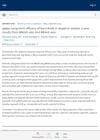 September 2024 in “Journal of the American Academy of Dermatology”
September 2024 in “Journal of the American Academy of Dermatology” Baricitinib maintains significant hair regrowth in severe alopecia areata over three years.
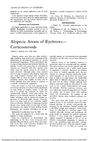 11 citations,
January 1961 in “Archives of dermatology”
11 citations,
January 1961 in “Archives of dermatology” Corticosteroid injections helped eyebrow hair regrow in men with alopecia areata.
355 citations,
January 2017 in “Journal of the American Academy of Dermatology” JAK inhibitors show promise for treating skin conditions like eczema, hair loss, and psoriasis.
 6 citations,
October 2022 in “American journal of clinical dermatology”
6 citations,
October 2022 in “American journal of clinical dermatology” The review shows how to properly diagnose and treat the loss of eyebrow and eyelash hair.
 28 citations,
December 2017 in “Lasers in Medical Science”
28 citations,
December 2017 in “Lasers in Medical Science” Monochromatic light devices, especially the 308-nm excimer laser, are promising for treating alopecia areata but more research is needed.
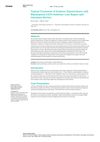 7 citations,
May 2018 in “Curēus”
7 citations,
May 2018 in “Curēus” Bimatoprost 0.03% solution effectively promotes eyebrow growth.
 28 citations,
December 2017 in “Journal of Investigative Dermatology Symposium Proceedings”
28 citations,
December 2017 in “Journal of Investigative Dermatology Symposium Proceedings” Tofacitinib shows promise for treating severe hair loss in adults and teens, with many experiencing regrowth, but hair loss returns when treatment stops.
 24 citations,
January 2018 in “International Journal of Trichology”
24 citations,
January 2018 in “International Journal of Trichology” Tofacitinib helped regrow hair in patients with alopecia, with few side effects.
 October 2020 in “International Journal of Research in Dermatology”
October 2020 in “International Journal of Research in Dermatology” The review suggests more research is needed to understand Frontal fibrosing alopecia, a condition causing hairline recession in postmenopausal women.
1 citations,
August 2021 in “Cosmoderma” Low-dose oral minoxidil is effective and well-tolerated for treating hair loss.
 December 2023 in “Journal of dermatology”
December 2023 in “Journal of dermatology” Adults and adolescents with severe alopecia areata are willing to take significant health risks for a better chance of hair regrowth.
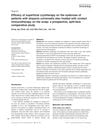 7 citations,
January 2017 in “International Journal of Dermatology”
7 citations,
January 2017 in “International Journal of Dermatology” Superficial cryotherapy significantly improves eyebrow hair growth in alopecia universalis patients.
 13 citations,
August 2018 in “Facial Plastic Surgery Clinics of North America”
13 citations,
August 2018 in “Facial Plastic Surgery Clinics of North America” Adipose tissue shows promise for hair regrowth, but more research is needed to confirm best practices and effectiveness.
 44 citations,
February 2015 in “Journal of the American Academy of Dermatology”
44 citations,
February 2015 in “Journal of the American Academy of Dermatology” Combining diphenylcyclopropenone with anthralin is more effective for hair regrowth in alopecia areata than using diphenylcyclopropenone alone, but may cause more side effects.
 102 citations,
April 2014 in “International Journal of Dermatology”
102 citations,
April 2014 in “International Journal of Dermatology” The treatment helped reduce symptoms and stabilize the hairline in most patients with Frontal Fibrosing Alopecia, but hair regrowth was limited.
 9 citations,
January 2020 in “Skin appendage disorders”
9 citations,
January 2020 in “Skin appendage disorders” Hair loss from conditions like LPP and FFA can potentially be reversed with the right treatment.
 July 2018 in “Nasza Dermatologia Online”
July 2018 in “Nasza Dermatologia Online” Frontal fibrosing alopecia and ulerythema ophryogenes may be related and can evolve from one to the other.
January 2023 in “Dermatologic Therapy” Intralesional corticosteroids and 5-alpha-reductase inhibitors are the best treatments for frontal fibrosing alopecia.
 December 2012 in “Drugs & Therapy Perspectives”
December 2012 in “Drugs & Therapy Perspectives” Doctors use their experience to choose treatments for scarring hair loss because it's hard to diagnose and treat.
 14 citations,
April 2019 in “International Journal of Women's Health”
14 citations,
April 2019 in “International Journal of Women's Health” Some treatments can stabilize Frontal Fibrosing Alopecia, but more research is needed to find effective treatments, and hair transplants often fail.
19 citations,
January 2019 in “JAAD case reports” A medication for skin rash also unexpectedly treated hair loss in a patient.
 1 citations,
July 2018 in “Elsevier eBooks”
1 citations,
July 2018 in “Elsevier eBooks” Alopecia Areata is an autoimmune hair loss condition, with various treatments showing mixed effectiveness and no guaranteed cure.
7 citations,
November 2021 in “JAAD Case Reports” Mogamulizumab can cause hair loss and skin rashes.
 June 2023 in “British journal of dermatology/British journal of dermatology, Supplement”
June 2023 in “British journal of dermatology/British journal of dermatology, Supplement” Some multiple sclerosis treatments may trigger hair loss conditions like alopecia areata.
 1 citations,
May 2024 in “Dermatology and Therapy”
1 citations,
May 2024 in “Dermatology and Therapy” Frontal Fibrosing Alopecia needs better diagnostics and treatments, with dutasteride showing promise.
 37 citations,
April 2019 in “Journal of The American Academy of Dermatology”
37 citations,
April 2019 in “Journal of The American Academy of Dermatology” Some treatments like intralesional steroids and 5α-reductase inhibitors are effective for frontal fibrosing alopecia, but more research is needed.
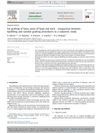 6 citations,
June 2018 in “Journal of Stomatology, Oral and Maxillofacial Surgery”
6 citations,
June 2018 in “Journal of Stomatology, Oral and Maxillofacial Surgery” Nanofat grafting is better for delicate areas and combining it with lipofilling might improve hair loss treatment.
 17 citations,
October 2017 in “Journal of Cutaneous Medicine and Surgery”
17 citations,
October 2017 in “Journal of Cutaneous Medicine and Surgery” No treatment has been proven to effectively stop hair loss or regrow hair in Frontal Fibrosing Alopecia, and more research is needed.
 2 citations,
June 2023 in “Indian journal of dermatology, venereology, and leprology”
2 citations,
June 2023 in “Indian journal of dermatology, venereology, and leprology” Janus kinase inhibitors can regrow hair in alopecia areata but may cause side effects and hair loss may return if treatment stops.
 January 2025 in “Indian Journal of Dermatology”
January 2025 in “Indian Journal of Dermatology” Frontal fibrosing alopecia is a challenging hair loss condition with no known cause or definitive treatment.

























